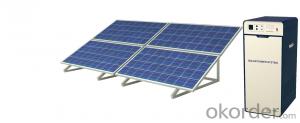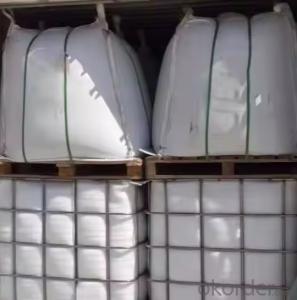Off-grid Solar Power System JS-SPS-1000
- Loading Port:
- Tianjin
- Payment Terms:
- TT OR LC
- Min Order Qty:
- 10 set
- Supply Capability:
- 10000 set/month
OKorder Service Pledge
Quality Product, Order Online Tracking, Timely Delivery
OKorder Financial Service
Credit Rating, Credit Services, Credit Purchasing
You Might Also Like
General Introduction
Solar power system provides alternating current and direct current, which is produced by the modules transforming solar power into power, to home lighting, household appliance and other DC appliance, such as cell phone and laptop.
Solar power system is widely used in area lack of power, for example house power supplying, monitoring, communication base, fire prevention in forest area, pasture and meadow, aquaculture etc.
We are dedicated to provide high quality off-grid PV products and systems to customers and has received a series of certificate, including ISO9001, TUV, UL, CE, CQC and RoHS.
Off-grid Solar Power System
High efficent PV module can produce more power.
Sine wave output is suitable for all kinds of load. Varieties of DC output, let it more
convenient for users.
The multifunction design make it easy to operation and maintenance.
Solar power system provides alternating current and direct current, which is produced by the modules transforming solar power into power, to home lighting, household appliance and other DC appliance, such as cell phone and laptop.
Solar power system is widely used in area lack of power, for example house power supplying, monitoring, communication base, fire prevention in forest area, pasture and meadow, aquaculture etc.
We are dedicated to provide high quality off-grid PV products and systems to customers and has received a series of certificate, including ISO9001, TUV, UL, CE, CQC and RoHS.
Off-grid Solar Power System
High efficent PV module can produce more power.
Sine wave output is suitable for all kinds of load. Varieties of DC output, let it more
convenient for users.
The multifunction design make it easy to operation and maintenance.
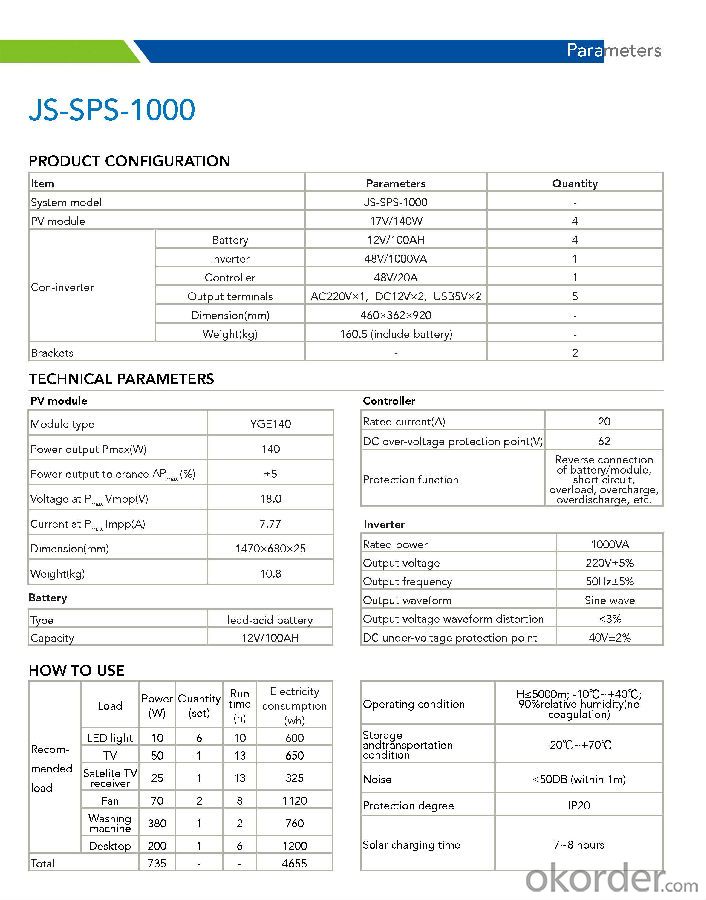
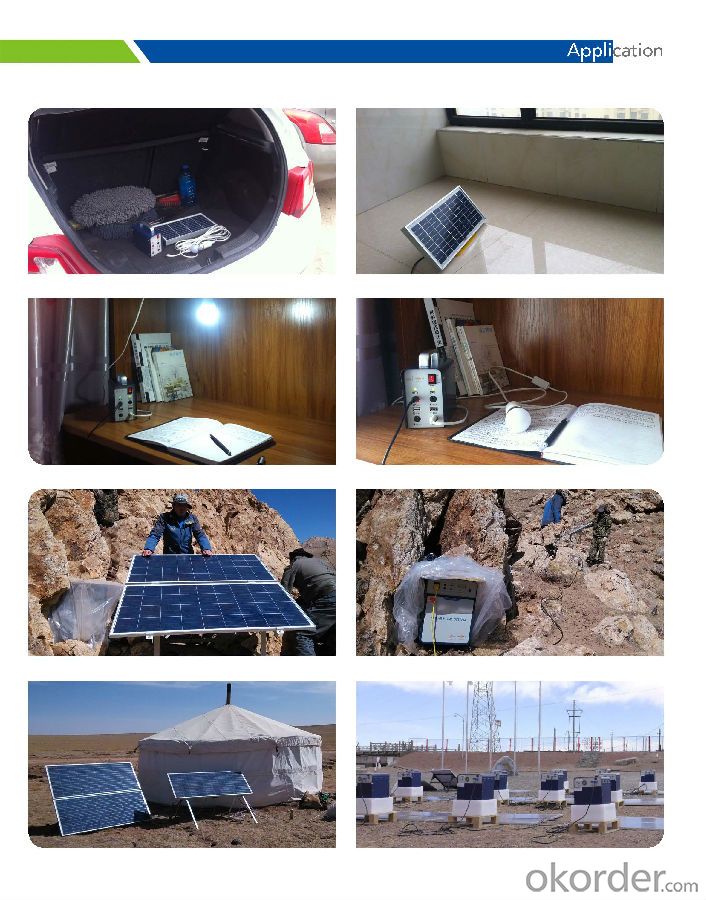
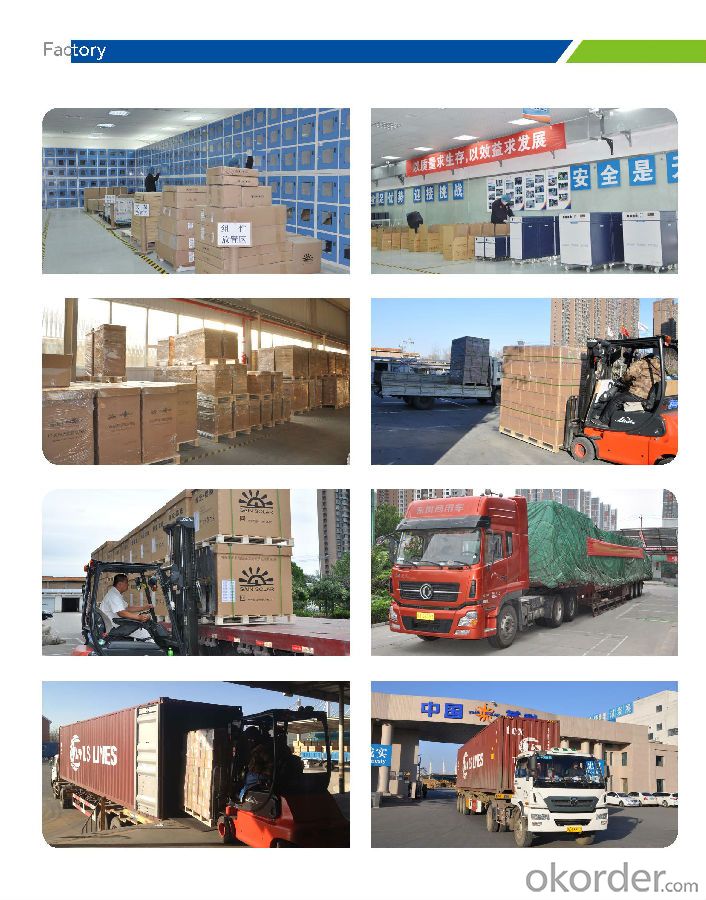
- Q:Are there any limitations to the lifespan of solar energy systems?
- Solar energy systems do have limitations to their lifespan, with the degradation of solar panels being the most significant. Over time, the photovoltaic cells in the panels gradually degrade, resulting in a decrease in efficiency. On average, solar panels experience an annual degradation rate of about 0.5-1%. This means that after 25-30 years, the panels may only produce around 75-80% of their original power output. Another limitation arises from the lifespan of other components in the solar energy system, including inverters, batteries (if applicable), and wiring. Inverters, responsible for converting the DC electricity generated by the solar panels into AC electricity for household or business use, typically last for 10-15 years. Batteries, if used for energy storage, have a limited lifespan of approximately 5-10 years. Wiring can also deteriorate over time due to exposure to the elements, necessitating maintenance or replacement. Moreover, the lifespan of solar energy systems can be impacted by environmental factors. Extreme weather conditions like hailstorms, hurricanes, or heavy snowfall can cause damage to solar panels, reducing their efficiency or rendering them inoperable. Additionally, excessive heat can accelerate the degradation of solar panels, leading to a shorter lifespan. Nevertheless, it is essential to highlight that proper maintenance and regular inspections can help maximize the lifespan and performance of solar energy systems. Many solar panels come with warranties that ensure their performance for a specific number of years, often ranging from 20 to 25 years. Furthermore, ongoing technological advancements and improvements in manufacturing processes may result in longer-lasting and more efficient solar energy systems in the future.
- Q:Can solar energy systems be used for powering water treatment plants?
- Yes, solar energy systems can be used for powering water treatment plants. Solar power can be harnessed through photovoltaic panels or solar thermal systems to generate electricity or heat, which can be utilized in various processes of water treatment, such as pumping, filtration, disinfection, and desalination. Solar energy offers a sustainable and renewable source of power, reducing the reliance on fossil fuels and lowering operational costs for water treatment facilities.
- Q:Can solar energy systems be used in areas with limited access to solar energy demonstration projects?
- Yes, solar energy systems can still be used in areas with limited access to solar energy demonstration projects. While demonstration projects can provide valuable information and resources for implementing solar energy systems, they are not essential for their use. Solar energy systems can be installed and utilized in any area that receives sunlight, even without the presence of demonstration projects.
- Q:Can solar energy systems be used in areas with limited access to healthcare facilities?
- Yes, solar energy systems can be used in areas with limited access to healthcare facilities. Solar energy can power medical equipment, refrigeration units for vaccines and medications, lighting for healthcare facilities, and other essential healthcare services. By providing a reliable and sustainable source of electricity, solar energy systems can help overcome the challenges of limited access to healthcare facilities in remote or underdeveloped areas.
- Q:What is the role of maximum power point tracking (MPPT) in solar energy systems?
- The role of maximum power point tracking (MPPT) in solar energy systems is to optimize the efficiency and output of the system by constantly adjusting the operating conditions of the solar panels to ensure they are operating at their maximum power point. MPPT algorithms track variations in sunlight intensity and adjust the voltage and current levels to ensure the panels are extracting the maximum amount of power from the available sunlight. This technology is crucial in maximizing the energy generation and overall performance of solar energy systems.
- Q:How does the age of a solar energy system affect its performance?
- The age of a solar energy system can affect its performance in several ways. Over time, the efficiency of solar panels can decrease due to wear and tear, resulting in a decrease in power output. Additionally, older systems may not have the same technological advancements and improvements that newer systems possess, leading to lower overall performance. Regular maintenance and monitoring can help mitigate some of these effects, but generally, the age of a solar energy system can have a negative impact on its performance.
- Q:What is the role of solar energy systems in reducing stormwater runoff?
- Solar energy systems do not directly reduce stormwater runoff. However, they can indirectly contribute to the reduction of stormwater runoff by reducing the demand for traditional energy sources such as fossil fuels. This, in turn, helps to mitigate climate change, which can lead to more intense and frequent rainfall events that contribute to stormwater runoff. Therefore, solar energy systems play a role in addressing the root causes of stormwater runoff by promoting more sustainable and environmentally friendly energy sources.
- Q:How do solar energy systems affect property values?
- Solar energy systems can have a positive impact on property values. Studies show that homes equipped with solar panels tend to sell at a higher price and faster than those without. This is primarily because solar systems reduce or eliminate electricity bills, resulting in long-term savings for homeowners. Additionally, solar energy is seen as a desirable and eco-friendly feature, appealing to environmentally conscious buyers. Overall, investing in solar energy systems can increase property values and attract potential buyers.
- Q:Are there any fire safety concerns associated with solar energy systems?
- Yes, there are fire safety concerns associated with solar energy systems. While solar panels themselves do not generally cause fires, issues can arise with the electrical components of the system, such as faulty wiring, improper installation, or inadequate maintenance. Additionally, firefighters may face challenges in fighting fires involving solar panels due to the risk of electrocution and the inability to easily disconnect the system from the electrical grid. Proper installation, regular inspections, and adherence to safety guidelines can help mitigate these concerns.
- Q:Can solar energy systems be used for heating and cooling?
- Yes, solar energy systems can be used for heating and cooling. Solar thermal systems can collect and store heat from the sun to provide hot water and space heating. Additionally, solar-powered air conditioning systems are also available, using solar energy to cool buildings.
1. Manufacturer Overview |
|
|---|---|
| Location | |
| Year Established | |
| Annual Output Value | |
| Main Markets | |
| Company Certifications | |
2. Manufacturer Certificates |
|
|---|---|
| a) Certification Name | |
| Range | |
| Reference | |
| Validity Period | |
3. Manufacturer Capability |
|
|---|---|
| a)Trade Capacity | |
| Nearest Port | |
| Export Percentage | |
| No.of Employees in Trade Department | |
| Language Spoken: | |
| b)Factory Information | |
| Factory Size: | |
| No. of Production Lines | |
| Contract Manufacturing | |
| Product Price Range | |
Send your message to us
Off-grid Solar Power System JS-SPS-1000
- Loading Port:
- Tianjin
- Payment Terms:
- TT OR LC
- Min Order Qty:
- 10 set
- Supply Capability:
- 10000 set/month
OKorder Service Pledge
Quality Product, Order Online Tracking, Timely Delivery
OKorder Financial Service
Credit Rating, Credit Services, Credit Purchasing
Similar products
New products
Hot products
Related keywords
